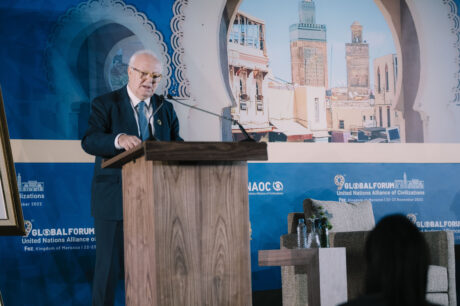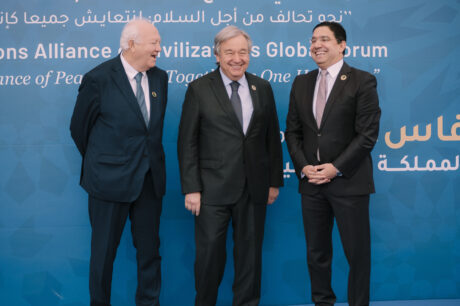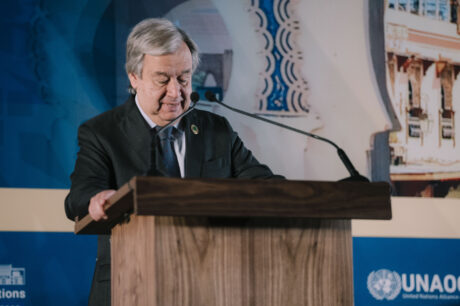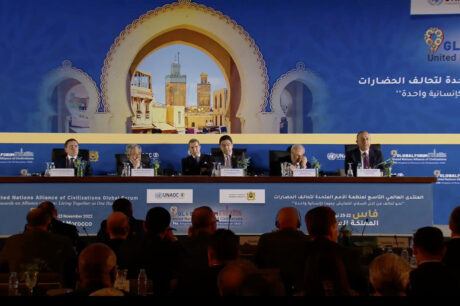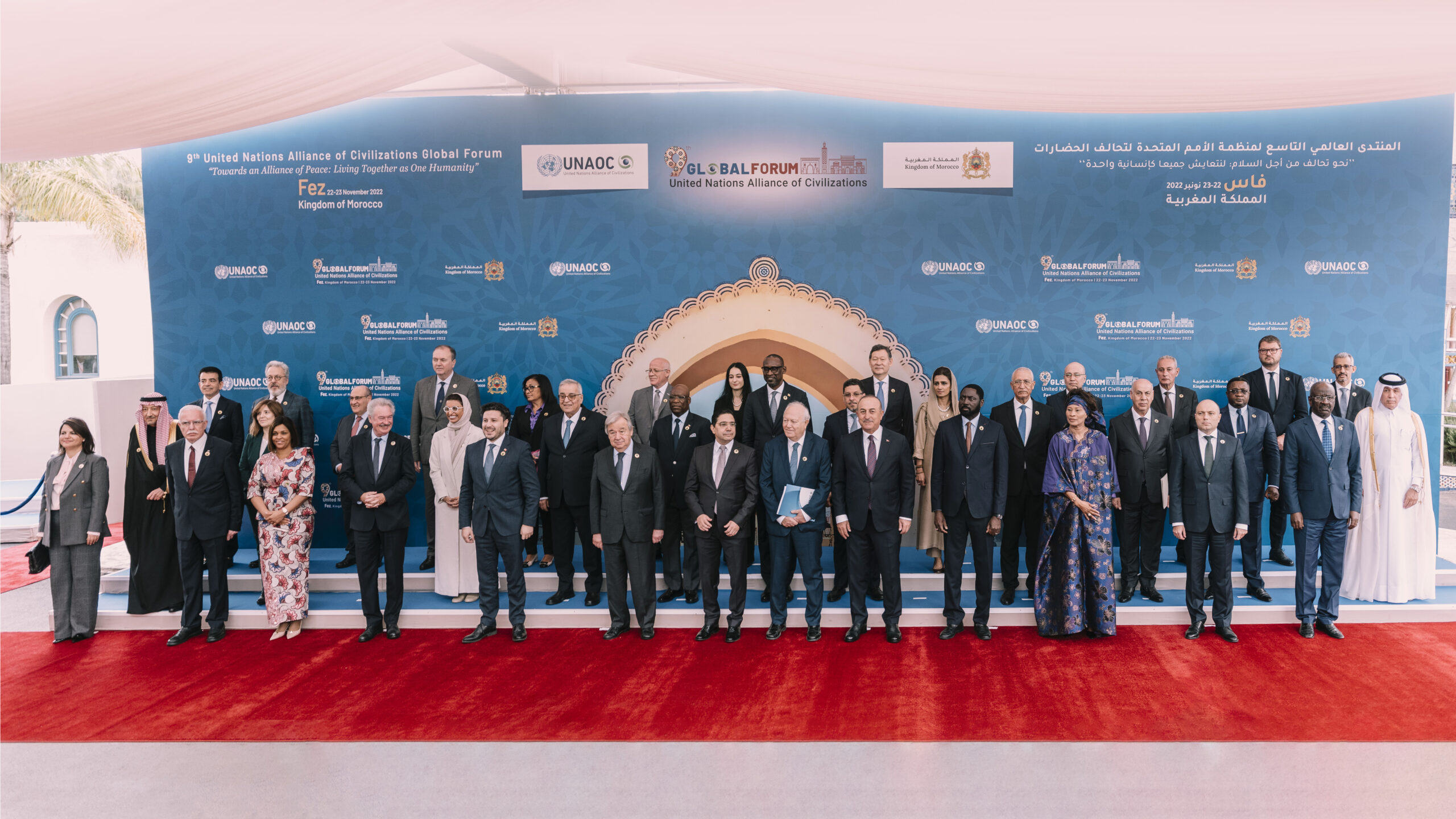9th Global Forum of the Alliance of Civilizations (UNAOC)
Fez, Kingdom of Morocco | November 22, 2022
Excellencies, Secretary General, Eminencies, Ministers, authorities, participants, friends:
Let me first express all my gratitude to the Government and people of the Kingdom of Morocco and, particularly, to His Majesty King Mohammed VI for his full support and leadership for organizing this 9th Global Forum of the United Nations Alliance of Civilizations.
My dear friends:
It has been three decades since the prestigious American political scientist, Samuel Huntington, delivered his famous lecture on the “clash of civilizations”. On October 19, 1992, at the American Enterprise Institute, the professor emeritus of Harvard and Columbia noted that “world politics was entering a new phase”, adding that “the fundamental source of conflict in this new world will not be ideological or economic… The great divide in humanity and the predominant source of conflict will be cultural and/or religious”. His theory, as we would say
today, went viral.
This year marks the 30th anniversary of Samuel Huntington’s announcement, and today in Fez, on the occasion of the 9th Global Forum of the United Nations Alliance of Civilizations, it seems appropriate to respond to his thesis and to defend today more than ever the need for a positive alliance of peace between the different civilizations of humanity.
We should in any case highlight the wisdom of the American political scientist in pointing out the complex nature of all conflicts. International disputes are the product of a range of variables and not only of a desire for power and hegemony, although this is, in the end, the definitive driving force to set any crisis in motion.
It is also true that the emeritus professor identified cultural issues as essential when analyzing conflicts. This cultural-religious dimension had not been rigorously taken into consideration until then as one of the elements to be taken into account when seeking solutions to international mediation and negotiation processes.
However, in the face of these significant elements of Huntington’s theory, there are multiple contradictions and questionable approaches.
First, there is a lack of a clear definition of the term “civilization”. In this sense, Huntington fails to properly define and distinguish between identity, culture and civilization. It is true that, in general, most analysts use these terms interchangeably without specifying the differences and the nature of each of these concepts.
Secondly, the thesis refers to the “clash of civilizations”, in general, including all of them. However, Huntington identifies the Islamic civilization as the main political and cultural adversary of the West.
Unfortunately, this thesis is the one that attracted the most attention and the one that fatally announced, as a chronicle of an attack foretold, to paraphrase Gabriel García Márquez, the attack on the Twin Towers on September 9, 2001 in New York. The collapse of the Twin Towers changed the international agenda and the Huntingtonian prophecy was revalued in the Western world, believing that they had found their new enemy: Islam.
Nevertheless, he practically ignored other great civilizations, such as the Chinese or Indian or the indigenous civilization from Latin America and Africa. I’m extremely happy and grateful that, here today, in this Forum, we can count on a high-level delegation coming from China, India, Latin America and, of course, from Africa.
This is one of Huntington’s most obvious mistakes: the desire to construct a divided and confrontational world in which the West must prevail and defend itself from any attempt to lose its hegemony and power. It is this categorical affirmation that is criticized and rejected by the vast majority of analysts and experts.
In short, international conflicts cannot be the sole consequence of religion, culture or civilizations. It must be stated bluntly: there is no clash of civilizations. There is a clash of interests and a clash of ignorances.
Dear friends:
It was this assessment that led the newly appointed Spanish government, after the terrorist attack in Madrid on March 11, 2004, to propose a totally different approach. The then President of the Spanish government, José Luis Rodríguez Zapatero, who is with us here today in Fez – thank you, Mr. President, for your vision and leadership – in his first address to the United Nations General Assembly in September of that year, proclaimed that, faced with the thesis of a “clash of civilizations”, the international community should establish an “Alliance of Civilizations”. His speech was received with surprise and satisfaction, as an innovative proposal within the political agenda of peace and security of the United Nations. Immediately after, the government of Türkiye and its President Erdogan joined in supporting this initiative.
Today, 17 years have passed since UN Secretary-General Kofi Annan made the “Alliance of Civilizations” an instrument of conflict resolution and preventive diplomacy. There have been many advances and achievements. In 2015, it received the final endorsement of the UN when the General Assembly adopted General Resolution A/RES/69/312 in 2015 granting it the status of a UN entity. Its contributions to help create a more respectful and fraternal society have led it to develop a whole series of projects and programs with a cross-cutting nature: migration, youth, education, media, and the role of women have been involved to provide the world’s societies with principles that should be incorporated as essential elements in all national governments, as well as in regional and international organizations.
After almost two decades of existence, their role and contribution deserve to be reviewed and made available to the new reality of the 21st century. As the current Secretary-General, Antonio Guterres, said in his address to the Group of Friends of the Alliance on September 29, 2020: “In this context, the role of the Alliance of Civilizations has never been more relevant to our 2030 Agenda objective of building more peaceful, just and resilient societies based on human rights and dignity of all. We need to promote the conditions where people of different identities, faiths and cultures can live in harmony, enjoying their fundamental freedoms.” End of quote.
As we pointed out: no, we are not facing a clash of civilizations. The world of the 21st century is global and interconnected. We are one humanity facing multiple global challenges.
The recent crises affecting the international community have shown us that there are no borders that can stop viruses and wars, whether they occur in Europe or in any other corner of the world.
They impact the entire international system. Paradoxically, a regional war, the war in Ukraine has affected the peace and stability of the entire international order.
Food prices and shortages, uncertainties about the supply and cost of energy, and the fragility of the financial system have once again placed the priority on the need to avoid greater evils, including nuclear armageddon.
The positive agenda of a peaceful and sustainable world is once again suffering the consequences of wars and conflicts. The world is once again becoming divided, and new walls of misunderstanding and confrontation are being built. A number of actors are speaking out and demanding a redefinition of a new international order. This new dialectic should not be seen as negative, provided that all parties understand that there is no alternative to a multilateral world that accepts and benefits from the plurality of actors, and that all are mobilized in favor of one humanity in peace and prosperity.
This is the major challenge faced by the Alliance of Civilizations. It is not a question of ignoring or not recognizing the existence of multiple cultures and/or civilizations, an indisputable reality, but rather ensuring that all actors accept and respect each other and collectively seek to safeguard the planet and humanity.
My dear friends:
The real danger is that we are facing new types of totalitarianism. A technological totalitarianism that wishes to totally control the behavior and action of human beings through political-economic practices that lead to the full surveillance of human beings. This leads to turning citizens into mere consumers where their freedom of choice or decision would be practically eliminated thanks to new technologies and the advance of Artificial Intelligence.
There is unanimity that we have and should invest in Artificial Intelligence, but above all and most importantly, we need to invest more in human intelligence. Unfortunately, very little is being done in this regard. Here, let me quote Sir David Khalili: “Common sense is not our common enemy.” Yes, investing in human intelligence should be our main concern. It’s common sense. A second totalitarianism moves in the socio-cultural world. The tendency of the main actors is precisely to create a uniform, flat, one-dimensional world where diversity and otherness are considered as negative elements that must be fought and eliminated. We are witnessing obsolete discourses that remind us of past times where only one ethnic group or race could be defended. This discourse of hatred, this racist attitude, should have disappeared after the monstrosity of the Holocaust in the 20th century.
It is in this debate that the Alliance of Civilizations can and must find its new place and legitimacy.
Dear friends:
No, we are not witnessing a clash of civilizations. What we are witnessing are clashes of interests and ignorance.
No, there is no clash of civilizations; what we are witnessing are clashes and struggles for hegemony and to attain zones of influence.
On the contrary, yes, there is only One Humanity.
Yes, the challenges are global and call for global responses.
Yes, the youth of the world are demanding responsibility and action from us. They want a better world. A sustainable planet and a fraternal humanity.
Yes, the Alliance of Civilizations can precisely serve as a platform to facilitate understanding, comprehension and respect for each of our cultures and civilizations, which in any case need each other in order to survive in the future.
The Alliance can and should be an initiative that studies and discovers the thousands of similarities and synergies that exist both at the philosophical-religious and practical levels among the different cultures and religions, while at the same time it can help to distinguish and identify their differences. These differences should be resolved in an open dialogue and peaceful manner in order to find solutions and avoid them from being manipulated and used as a source of controversy.
In short, the Alliance of Civilizations must become an Alliance of Civilizations for Peace. Recent developments on the international scene indicate an extremely dangerous trend of confrontation between blocks.
The Alliance of Civilizations by its very conception and by its very will is and can be the platform where bridges of understanding and cooperation are permanently maintained and built.
Young Asians, Chinese, North Americans, Latin Americans, Africans, Russians and Europeans, should talk to each other, respect each other and seek shared solutions for their present and their future.
It is not a question of renouncing the achievements of the various civilizations, including of course the Western civilization, but it is a question of recognizing the legitimacy of all those civilizations that were unable to defend their approaches and that now consider that the time has come to be able to demonstrate their culture and civilization on an equal footing. In this new distribution of the cards, certain rules must be maintained and reinforced. In particular, the 1948 Declaration of Human Rights. This must remain the general framework accepted by all. Next year will mark the 75th anniversary of its adoption.
In conclusion, thirty years after Samuel Huntington’s lecture, we can proclaim without any doubt that there has not been a clash of civilizations.
What is most relevant is that Professor Samuel Huntington, in one of his last articles, concluded by saying: “We should all accept that there will not be a universal civilization, but on the contrary: a world with different civilizations that will have to learn to coexist with each other.”
In short, the emeritus professor’s ultimate advice is “to learn to coexist with each other”. It is true that Samuel Huntington is inspired by the traditional Western concept existing at that time where concepts such as “tolerance” and “coexistence” were pronounced and considered as positive manifestations.
Today, we, the world’s citizens, should be able to express ourselves with a sufficient level of maturity and development and take a leap towards building a positive terminology and political action. In the face of negative concepts and attitudes, we should defend a new positive vocabulary:
In the face of defending tolerance, let us defend mutual respect.
In the face of defending coexistence, let us defend living together: “convivencia”.
In the face of defending minorities, let us defend the equal rights of all citizens.
In the face of exclusion and separatism, let us defend inclusion and fraternity.
In the face of only a dialogue of civilizations, let us engage ourselves in an Alliance of Civilizations, in a collective commitment.
This task can and must be developed by an Alliance of Civilizations for Peace.

